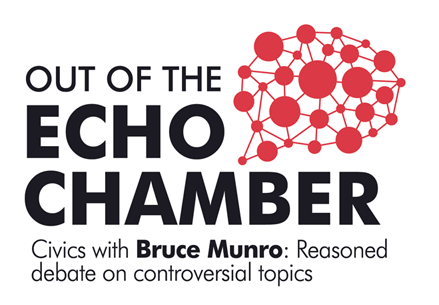
Debate only seems to become more polarised, more of us safely cocooned inside echo chambers where our preconceptions are unchallenged. So how do we change our minds?
In this column, the second in a new series in The Weekend Mix, and published today online, we attempt to rediscover the art of debate. The contributors to this column - drawn from the Otago community - don’t know who they are arguing with.
They are simply engaging with the argument, thinking about the alternative point of view and responding. We hope it is a useful exercise.
Should cannabis be legalised for people aged 20 years and over? That is the referendum question all New Zealand voters will have a say on in September’s general election.
If the referendum result is in favour of legalisation, those aged 20 and over will be able to purchase cannabis. Private cultivation will be regulated, there will be a ban on cannabis advertising, purchase will be through licensed retailers and consumption of cannabis will be only allowed on private properties or licensed premises.
OPENING STATEMENT: AFFIRMATIVE

OPENING STATEMENT: NEGATIVE

My concern is that legalisation will send the wrong message, that cannabis is harmless, which is not true. At 20 years old, young people’s brains are still developing, and legalisation will make it easier for even younger people, below the legal age, to access cannabis too. People of all ages are likely to underestimate how long they continue to be influenced by cannabis, compromising decision-making, workplace performance and safety. And those who are particularly susceptible genetically to adverse effects of cannabis on their mental health won’t know until it’s too late.
AFFIRMATIVE: OK, LET ME RESPOND TO THAT

Some of the regulatory safeguards proposed aim to address the concerns about under 20 year olds accessing cannabis; including a ban on advertising, purchase through licensed retailers only and consumption only allowed on private properties or licensed premises. Workplaces should continue to have drug tests as part of their health and safety policies. We also need to make resources available to help people who develop dependency or other health issues. Keeping cannabis illegal isn’t working and wastes police, justice and societal resources and criminalises a significant percentage of New Zealanders.
NEGATIVE: OK, LET ME RESPOND TO THAT

Being illegal currently I believe will be deterring some people from smoking cannabis, and the safeguards in the proposed legislation will not be effective; an age limit does not stop younger people from accessing alcohol and cigarettes. Regulation is not going to change the fact that there is variability in quality of a naturally grown product - unless varieties are also going to be regulated. A regulated regime would be expensive to run and result in an expensive product. There will be people who can’t or don’t want to grow their own, or can’t access or afford a licensed retailer. A regulated regime will not eliminate illegal trade.
AFFIRMATIVE: YES, I CAN ENGAGE WITH THAT

I agree that cannabis (like all drugs) can cause harm. We need to reinforce the message that cannabis can harm. And it’s true that young people are particularly vulnerable to all drugs. Depending on which studies we choose to quote, up to 80% of New Zealanders will try cannabis by the time they are 21 (Christchurch longitudinal study). What we are doing currently is not protecting our young or vulnerable. Ideally the age for purchase should be over 25 years when brains are more fully developed. In order to educate people and reduce potential harm (particularly for teenage brains and those genetically susceptible to mental illness) we need to be able to talk about cannabis in a factual, honest way and support people to make better choices.
NEGATIVE: YES, I CAN ENGAGE WITH THAT

I agree that some people are not deterred from smoking cannabis by the risk of prosecution, and perhaps a review of the penalties would be appropriate. I agree also we currently face social and justice issues from cannabis use, but a regulated regime would not satisfactorily address those issues - it doesn’t for alcohol. However, we should improve on the status quo by increasing focus on harm reduction. People seeking to overcome dependency should be able to access help on a confidential basis despite the illegality. The money that would be spent setting up a regulated regime would be better spent on health education and on confidential treatment options.
AFFIRMATIVE: FAIR ENOUGH, IT’S NOT STRAIGHTFORWARD

‘‘The primary objective of the legislation is to reduce overall cannabis use and limit the ability of young people to access cannabis,” MP Andrew Little stated in 2019. The evidence convincingly shows people are not deterred. A Cannabis Regulatory Authority will ensure the environment is significantly safer than the status quo including setting limits on the levels of THC (the psychoactive substance). Treasury predictions show the Government could generate $240 million a year taxing cannabis rather than spending $400 million a year enforcing drug prohibition and pursuing gangs. The current law causes more harm than it prevents with prohibition disproportionately affecting males, Maori and youth. We should focus on education, harm reduction and protecting those under 25 years.
NEGATIVE: FAIR ENOUGH, IT’S NOT STRAIGHTFORWARD

I am afraid that the proposed regulated regime will make cannabis more expensive, will not eliminate illegal trade, and will not solve the social and justice issues we currently face. It brings with it an increased risk of harm because it condones cannabis use, will decrease workplace safety and will make access easier for young people. But that doesn’t mean we can’t improve on the status quo. We do need to reduce the harm that cannabis use causes. That means more education about how long its effects can last and what it does to the brain, and easier access to treatment options. The common goal has got to be reducing the harm that cannabis use causes.

Comments
"The current law causes more harm than it prevents with prohibition disproportionately affecting males, Maori and youth."
"80% of New Zealanders will try cannabis by the time they are 21"
Changing the law because we hold concerns about specific sections of the population sounds compassionate but is it? I would argue that removing barriers as to what is acceptable self abuse, simply moves it to the next level which leads to greater harm.
Children are always testing parental barriers as to what is acceptable and as they develop into the teenage years, they test society at large.
Arguing "Government could generate $240 million a year taxing cannabis rather than spending $400 million a year enforcing drug prohibition and pursuing gangs" totally discusses me. This appeals to pure self interest and conflates the issue by incorporating gangs.
Governments committing less than $10 per head of the population, per year to tackle these destructive forces show the level of commitment they have to public health, especially as gangs are THE major distribution network of hard drugs.
A $100 commitment would be more appropriate.
No, it should not be legalised, driving while high, going to work still high, the smell gets into your clothes exposing others to thc, it gets on to the cash the dealer has. If they want the benefits of thc it should be extracted from the plant and treated like a regulated drug.
Medical cannabis with no high, yes. Recreational, no...
In Oz, more people are now caught drug driving than drunk driving. There's enough zombies roaming the streets as it is. Also, there are now 4 states in the US that have decriminalised magic mushrooms! Where will it end?
Removing the forbidden fruit status and educate to create social change would be much better then what we have.
Informing that it will permanently lower your IQ if you use at a young age(supposedly 8 points if your under 18), and the significant risk to mental health, should make it unpopular for youth in an increasingly competitive world.
And finally bring the weed smokers and growers out of the criminal world and into law abiding (and tax paying) society, and supposedly there is a large growing market for cannabis products internationally so could create a lot of jobs.
With the taxes to power it, shine a big bright light on it and let the people make up their own mind.













